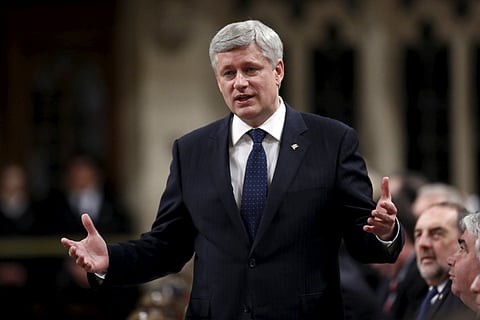A climate-change conundrum in Canada
Beating climate change depends to an uncomfortable degree on whether national leaders want to

Last week’s announcement that Canada will not match US emission-reduction targets offers a fresh look at Canadians’ enduring bipolarity on climate change: They are far more likely than Americans to say the problem is real, yet keep voting for a government that does nothing about it. Therein lies a cautionary tale for the rest of the world.
In a narrow sense, Prime Minister Stephen Harper’s statement marks a reversal. He has long used the absence of a US climate policy to justify his government’s failure to introduce oil and gas regulations that he had first promised almost a decade ago, on the logic that the two countries are too economically integrated to pursue different approaches. Now that US President Barack Obama has set an official target — a 26 per cent to 28 per cent reduction in greenhouse gases by 2025 — Harper is saying the American policy is too aggressive to match.
But the Canadian decision is really the culmination of years of hostility towards the idea of fighting climate change. Harper’s government pulled out of the Kyoto protocol in 2011, dismissed environmental groups as foreign pawns and gave its version of the Internal Revenue Service a new mandate and extra funding to target them. It closed climate research programs, laid off scientists and prohibited those who remain from speaking to the news media. And the latest data show that unless something changes, the country will not come close to its 2009 Copenhagen pledge to cut emissions 17 percent by 2020.
Here is what makes the Conservative government’s resistance to climate policy puzzling: In poll after poll, Canadians say they support such a policy. Eighty-one per cent say there is “solid evidence” of global warming, compared with just 61 per cent of Americans. (Even among Conservative Party supporters, 68 per cent agree — roughly the same share as Democrats in the US). And 54 per cent say their country “can and should do more to reduce emissions”, compared with 29 per cent who favour the status quo and just 5 per cent who say Canada is doing more than it should. More than two-thirds said they support “a financial incentive” to cut emissions, including 56 percent of Conservatives. Almost 2 in 3 support using taxes to do so.
That is a level of support that US climate advocates can only dream of. So why haven’t the Canadians’ views translated into federal policy? The answer is that climate action is drowned out by other issues: Just 18 per cent of Canadians ranked the environment among their top three priorities in a survey last week, according to David Coletto, chief executive officer of Abacus Data, an Ottawa polling firm.
That is down from 23 per cent in a similar survey last year — behind health care, job creation, taxes, debts/deficits, and “accountability and trust,” and tied with middle-class incomes and retirement security. In both surveys, just 5 per cent of the respondents ranked environment as their top concern.
“Canadian public support for climate change action has been stable, but it is not an election issue at any level,” Keith Neuman, executive director of the Toronto-based Environics Institute for Survey Research, told me in an e-mail. “So most parties can get away with saying it is important without committing to any policies.”
Canada’s announcement last week illustrates what ought to be the greatest concern for climate advocates: Getting countries to cut their carbon emissions depends on more than just generating public support. Absent some genuine calamity, climate change will never swing votes; we are just not wired in a way that makes us care enough about small or distant threats. So changing policy will require electing officials who, for reasons of personal conviction, want to do something that cannot be justified by electoral considerations alone.
Obama arguably meets the description (although, as the New Yorker’s Ryan Lizza argued in 2010, he missed his best chance at meaningful legislation). But the next president, even if it is Hillary Clinton, will not face any great cost for inaction; once that person takes office, how hard to push on climate is largely up to them. The same is true in Canada and elsewhere. (Maybe the pope can help appeal to those leaders’ consciences.)
A corollary of the importance of individual leaders is that progress on climate is not teleological: The endpoint is not assured, and there are no grounds for assuming that countries will keep getting better, because voter support is not sticky enough to hold their successors to the same policies — something Australia’s repeal of its carbon tax last year demonstrated.
The lesson from Canada will only bring more anxiety to environmentalists: Beating climate change (or, at this point, averting its most devastating effects) depends to an uncomfortable degree on whether national leaders want to. That arrangement may have the trappings of responsive government. Underneath, it looks a lot more like luck.
— Washington Post


